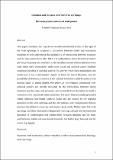Files in this item
Islamism and the state after the Arab uprisings : between people power and state power
Item metadata
| dc.contributor.author | Volpi, Frederic | |
| dc.contributor.author | Stein, Ewan | |
| dc.date.accessioned | 2016-09-26T23:34:36Z | |
| dc.date.available | 2016-09-26T23:34:36Z | |
| dc.date.issued | 2015 | |
| dc.identifier | 179933803 | |
| dc.identifier | 9be8dbbc-1e76-404c-a4c6-17df33385bba | |
| dc.identifier | 84929025390 | |
| dc.identifier | 000353453000005 | |
| dc.identifier.citation | Volpi , F & Stein , E 2015 , ' Islamism and the state after the Arab uprisings : between people power and state power ' , Democratization , vol. 22 , no. 2 , pp. 276-293 . https://doi.org/10.1080/13510347.2015.1010811 | en |
| dc.identifier.issn | 1351-0347 | |
| dc.identifier.uri | https://hdl.handle.net/10023/9561 | |
| dc.description | The authors would like to thank the Arts and Humanities Research Council for facilitating the research for this article through their support of the research network People Power versus State Power of the Centre for the Advanced Study of the Arab World. | en |
| dc.description.abstract | This paper examines the trajectories of different Islamist trends in the light of the Arab uprisings. It proposes a distinction between statist and non-statist Islamism to help understand the multiplicity of interactions between Islamists and the state, particularly after 2011. It is outlined how statist Islamists (Islamist parties principally) can contribute to the stabilization and democratization of the state when their interactions with other social and political actors facilitate consensus building in national politics. By contrast when these interactions are conflictual, it has a detrimental impact on both the statist Islamists, and the possibility of democratic politics at the national level. Non statist-Islamists (from quietist salafi to armed jihadi) who prioritize the religious community over national politics are directly impacted by the interactions between statist Islamists and the state, and generally tend to benefit from the failure to build a consensus over democratic national politics. Far more than nationally-grounded statist Islamists, non-statist Islamists shape and are shaped by the regional dynamics on the Arab uprisings and the international and transnational relations between the different countries and conflict areas of the Middle East. The Arab uprisings and their aftermath reshaped pre-existing national and international dynamics of confrontation and collaboration between Islamists and the state, and between statist and non-statists Islamists, for better (Tunisia) and for worse (Egypt). | |
| dc.format.extent | 539608 | |
| dc.language.iso | eng | |
| dc.relation.ispartof | Democratization | en |
| dc.subject | Islamism | en |
| dc.subject | State institutions | en |
| dc.subject | Conflict | en |
| dc.subject | Transnationalism | en |
| dc.subject | Ideology | en |
| dc.subject | Arab uprisings | en |
| dc.subject | JZ International relations | en |
| dc.subject | BDC | en |
| dc.subject | R2C | en |
| dc.subject | SDG 16 - Peace, Justice and Strong Institutions | en |
| dc.subject.lcc | JZ | en |
| dc.title | Islamism and the state after the Arab uprisings : between people power and state power | en |
| dc.type | Journal article | en |
| dc.contributor.sponsor | Arts and Humanities Research Council | en |
| dc.contributor.institution | University of St Andrews. School of International Relations | en |
| dc.identifier.doi | https://doi.org/10.1080/13510347.2015.1010811 | |
| dc.description.status | Peer reviewed | en |
| dc.date.embargoedUntil | 2016-09-26 | |
| dc.identifier.grantnumber | en |
This item appears in the following Collection(s)
Items in the St Andrews Research Repository are protected by copyright, with all rights reserved, unless otherwise indicated.

